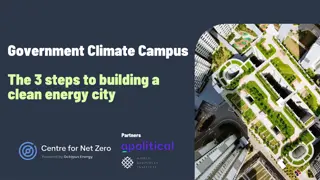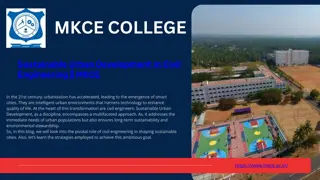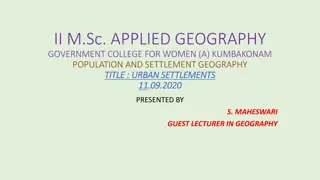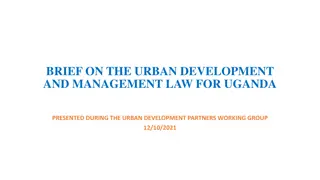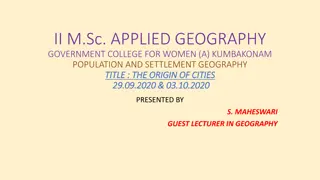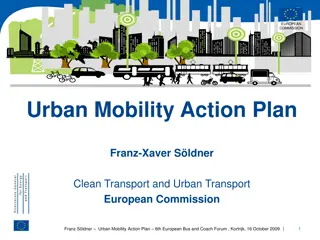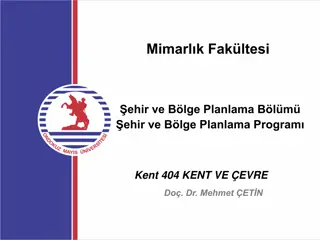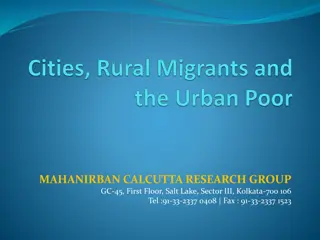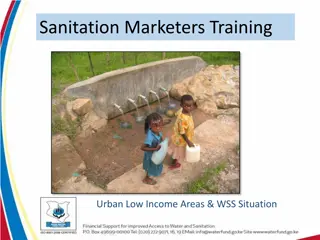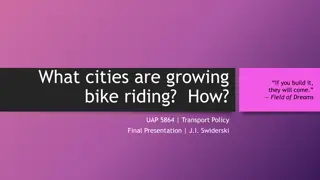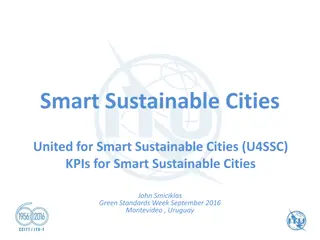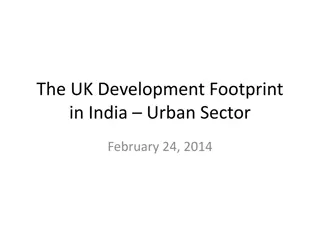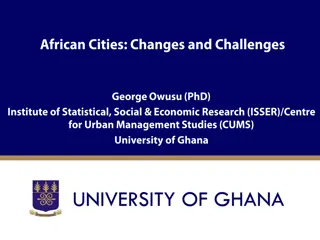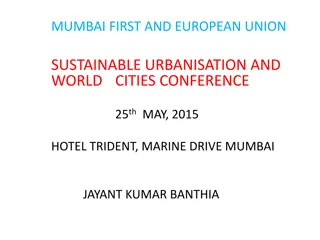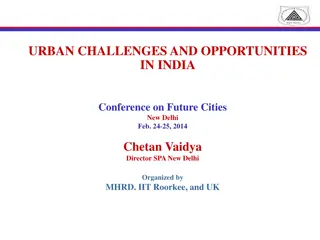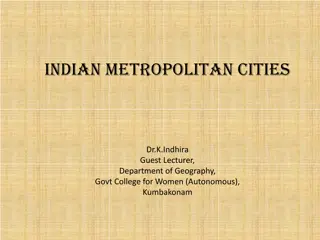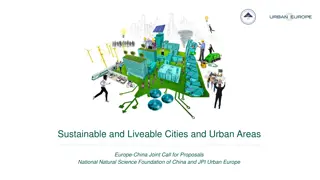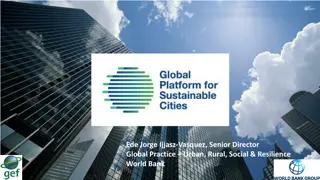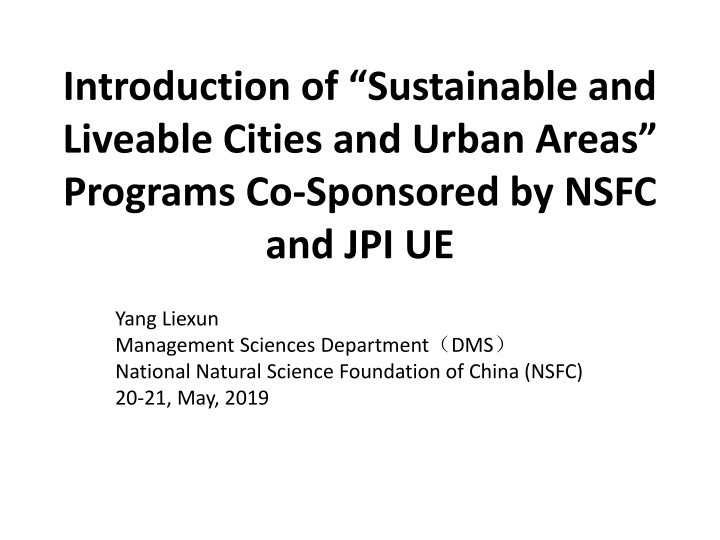
Sustainable and Liveable Cities and Urban Areas Programs
"Co-Sponsored by NSFC and JPI UE, Yang Liexun Management Sciences Department, DMS National Natural Science Foundation of China (NSFC) on 20-21 May 2019."
Download Presentation

Please find below an Image/Link to download the presentation.
The content on the website is provided AS IS for your information and personal use only. It may not be sold, licensed, or shared on other websites without obtaining consent from the author. If you encounter any issues during the download, it is possible that the publisher has removed the file from their server.
You are allowed to download the files provided on this website for personal or commercial use, subject to the condition that they are used lawfully. All files are the property of their respective owners.
The content on the website is provided AS IS for your information and personal use only. It may not be sold, licensed, or shared on other websites without obtaining consent from the author.
E N D
Presentation Transcript
Introduction of Sustainable and Liveable Cities and Urban Areas Programs Co-Sponsored by NSFC and JPI UE Yang Liexun Management Sciences Department DMS National Natural Science Foundation of China (NSFC) 20-21, May, 2019
Objectives of the Program Both China and European countries are facing great challenges during the urbanisation process, such as environmental impacts, safe and sustainable urban infrastructure, and climate change concerns. In early 2017, NSFC and JPI UE decided to establish a longer-term cooperation on sustainable urbanisation to achieve the following objectives: Enhance cities and urban areas capacities for sustainable urbanisation and the required urban transition processes; Create knowledge and evidence for urban transitions pathways under different regional and local conditions (e.g. cultural, climate, economic, social).
Joint Activities To achieve these objectives, NSFC and JPI UE planned to Establish a common research and innovation community to address key issues of sustainable urban development; Create and validate knowledge on integrated urban development and build capacities in cities and municipalities in Europe and China on new urban practice; Fund research and innovation projects that contribute to the agendas of NSFC and JPI Urban Europe by addressing common issues of both regions and/or testing concepts against the different requirements of Chinese and European cities.
Major Events during the 1stPhase Cooperation 8 9 May 2017 Expert workshop on thematic priorities in Hangzhou; June-Dec 2017 Call preparation; Feb 2018 Joint call launched; Jun 2018 114 proposals received; Jun-Sep 2018 Formality examination with 77 proposals passed; Sep-Oct 2018 Peer review started; 29-31 Oct 2018 Evaluation panel meeting in Paris; Nov-Dec 2018 Final funding decision made with 11 proposals approved
Requirements in the Call Four research areas 1 Climate change and new urban economies; 2 Transformation of energy systems to strengthen urban circular economies; 3 Urban public administration and services innovation; 4 Urban data management. Three executive years (Mar, 2019-Feb, 2022) China s team is required to have at least two but no more than three institutes involved. The European team is required to have members from at least two countries within the JPI UE scope.
Funding Agencies Participating in the Call China Austria Belgium France Latvia The Netherlands Netherlands Organisation for Scientific Research (NWO) Norway The Research Council of Norway (RCN) Poland National Science Centre (NCN) Sweden Swedish Energy Agency (SWEA) United Kingdom Economic and Social Research Council (ESRC) National Natural Science Foundation of China (NSFC) Austrian Research Promotion Agency (FFG) Fonds de la Recherche Scientifique (F.R.S.-FNRS) The French National Research Agency (ANR) Ministry of Education and Science (IZM)
Evaluation Panel Meeting in Paris NSFC recommended 17 reviewers from China, and JPI UE recommended 17 reviewers from Europe. All reviewers attended the evaluation panel meeting in Paris, at site or remotely. 77 proposals were divided into three groups based on their topics. Each proposal was assigned to 5 reviewers, 2 or 3 from China and 2 or 3 from Europe. The proposals were sent to the reviewers 2-4 weeks before the Paris meeting. 5 reviewers gave scores for one proposal independently on its novelty and quality, and the five scores were taken into account equally to get a finally score. The funded proposals were selected in the order of the finally score from high to low. 10 proposals were planned to be funded at the beginning. If the quota comes to a proposal but the related funding agency is running out of budget, then the quota will go to the next highest-score proposal.
Funded Proposals 11 proposals are funded, with a total budget of about 22 million RMB from China s side (2 million for each). Applicants from Applicants from China China Applicants from Applicants from EU EU Institutes Institutes Institutes Institutes Beijing University of Aeronautics and Astronautics The Institute of Urban Environment, CAS Eindhoven University of Technology 1 Haijun Huang Feixiong LIAO 2 Shenghui Cui Lingxuan Liu Lancaster University 3 Qingquan Li Shenzhen University Michael Batty University College London 4 Chongqing Kang Tsinghua Univeristy Richard Green Imperial College London 5 Meng Xu Beijing Jiaotong Univeristy Erik Verhoef Vrije Universiteit Amsterdam 6 Ye Li Tongji University Alex Lord University of Liverpool The Institute of Urban Environment, CAS Michael HutchinsUK Cetre for Ecology and Hydrology Norwegian University of Science and Technology IVL Swedish Environmental Research Institute Norwegian University of Science and Technology Wilfried Winiwarter Systems Analysis (IIASA) 7 Shen Yu 8 Xiaomei Zhao Beijing Jiaotong Univeristy Chaoru Lu 9 Bin Chen Beijing Normal University Johan Holmqvist 10 Shaopeng Wu Wuhan University Of Technology Inge Hoff International Institute for Applied 11 Lin Zhang Peking University
Next Steps Through international collaboration, major issues during urban development can be observed and examined from multi-perspectives. Scientists from both sides were able to gain a better understanding on these issues, which would contribute to the knowledge system in the world. The executive period of these projects was three years, which was enough to start the collaboration, but far from enough to solve the key scientific issues of the above topics. Continuous supports will be needed and more common interests need to be included. Further efforts will be needed for the next phase of joint- programs, more topics could be included, such as urban environmental issues, population transition, etc.

